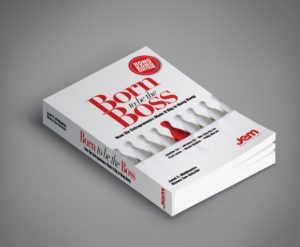By Janet E. Middlemiss and Bianca Zee-Geissler
Being an entrepreneur and running a business can sometimes feel incredibly lonely.
Although most of us like our independent lives and the freedom of being our own boss, the challenges and pressures of business ownership can sometimes leave us feeling emotionally drained and isolated. Especially when things go wrong or don’t go to plan, any sentiments of solitude can easily intensify. And let’s face it, there isn’t a business founder in the world that hasn’t felt this.
Particularly today, many early-stage businesses are started and run by individuals from their homes. This often means that home-based entrepreneurs may find themselves working in isolation, a disconnect likely to be amplified given that much of today’s communication is undertaken digitally.
If we are honest, we have all experienced what it is like to battle the inner angst, stresses, and anxieties that seem to surface when our deals don’t work out, when progress is slow, when we face setbacks to our plans or when someone lets us down.
We work long hours, brains never switching off, worrying about cash flow or uncertain situations that conspire to consume and keep us up all night. Trails of thought that are detrimental as they may lead to us doubting ourselves or worst still, sabotaging projects that we regard as important.
Keeping your sanity and not losing your mind while trying to launch and build your own business is, therefore, easier said than done, especially when one considers the emotional volatilities and insecurities that go hand in hand with navigating the choppy waters of startup.
Entrepreneurship comes at a psychological price for which managing a business can be a lonely affair – more so if you work from home. Even if you have employees and contractors, the burden of all major decisions and challenges fall on your shoulders. The buck stops with you and that, at times, is stressful.

Until recently, admitting to such inner struggles was considered unthinkable. In our society, we usually look up to successful entrepreneurs that are in the public eye, holding them in such high regard that we neglect to consider the emotional turmoil that they have been through or their vulnerabilities.
As business owners, we want to project a positive impression of ourselves by putting our best foot forward despite, if behind the scenes, we are silently battling issues that are troubling us. In fact, when it comes to establishing credibility, home-based businesses face their own unique set of challenges, compounding further the need to come across as legitimate.
That being said, before making it big, many entrepreneurs grabbing the headlines today have struggled through periods where they have been hit by strong feelings of despair and anxiety. Times when they have had the rug pulled out from beneath them or when it seemed that everything might fall apart. Periods of personal stress exacerbated by long hours, sleepless nights, plus the pressure to succeed.
By its own nature, it is an intriguing topic that pretty much affects everyone who has trodden the path of entrepreneurship. Namely, how does one overcome the inherent emotional challenges and turbulences associated with starting and managing a business?
Despite its universal significance, it surprisingly is also a subject matter that arguably doesn’t always get as much attention as it deserves. It is a side to running a business that entrepreneurs rarely talk about, perhaps because any signs of vulnerability could be misinterpreted as a weakness.
Be that as it may, the issue warrants investigation given that mental struggles can not only exhaust, debilitate and overwhelm us, but at worst they can knock us off course. Strictly speaking, it is hard to think straight when your emotions are working overtime as you are confronted by scenarios that are nothing less than uncomfortable or uncertain.

We asked them about what it takes to launch one’s own venture, specifically the difficulties surrounding handling anxiety, burnout, and stress. We also asked them to talk us through the tough times, the ups and downs, how they dealt with setbacks, and what they learnt in retrospect.
Interestingly, what each of these enterprising individuals has in common is how they respond to the stresses of business ownership. This includes the emotional strains that can easily arise from being a jack-of-all-trades to having to deal with daily problems.
Despite their array of failures and misfortunes, we were taken aback by their mental fortitude, personal perseverance and positive dispositions in the face of impediments. Many are able to see opportunities in trying situations. It seems to condition them to be able to handle emotional upheavals, not to mention constant knockbacks.
Take, for instance, Jennifer Liu, founder of the lifestyle dining group, Sir Hudson International. Jennifer says learning to manage her emotions has been a key element to success. When negativity sets in, Jennifer says she acknowledges her emotions and tries to remind herself that she can get past them.
“You cannot always change conditions but you can change the way you deal with them,” states Jennifer. “It is part and parcel of learning how to handle stressful situations in business and to adapt to the environment around you.”
In no uncertain terms, this is when persistence and self-belief can pay off. It has unquestionably worked for Hong Kong Matchmakers’ founder Mei Ling Ng Liu who had to endure the disheartening remarks of skeptics when trying to launch her now incredibly successful matchmaking business.
While no one in business is immune to either disappointments or criticism, Mei Ling offers helpful tips for dealing with let downs and negative vibes, including not to take it personally. As opposed to allowing disappointments to derail her, they simply make Mei Ling more determined for which her advice to others facing a similar predicament is, “If you truly believe in your concept, just go on and make it happen.”
They are sentiments echoed by Pilar Morais, co-founder and Chief Executive Officer of the serviced apartment chain, CHI Residences. Pilar admits that there have been moments in her entrepreneurial journey when she categorically thought about giving up and walking away.
With the experience of hindsight, however, Pilar adds that these are the very times when you need to stand by the courage of your convictions and have faith in what you are doing. In other words, the key is not to give up but to find other ways to lift yourself on days that are more challenging and grueling.
When the chips are down, a great support network can consequently provide comfort. It pays to surround yourself with people whom you can discuss your ideas, concerns and alternative courses of action. Besides, simply discussing a worrying situation with someone else can help to make you feel better.
Other tactics include taking the time to confront and eradicate major stresses by setting time aside to efficiently address stressful tasks and issues. Eating right, sleeping right and getting plenty of exercise can go a long way to improving one’s frame of mind, as can making the time to engage in mood-lifting recreational activities outside of the workplace.
Should you feel burdened or overwhelmed, working harder it seems is also not the answer. Instead of fretting or staring blankly at a computer screen all day, it can be hugely beneficial to step away to de-stress and reset, plus regain balance and perspective.
Aside from time to realign, setting realistic goals can, similarly, help to alleviate emotional pressures associated with major projects. Focusing on ‘progress’ as opposed to ‘perfection’ is another useful technique to consider, as is practicing self-care and being kind to yourself, remembering that entrepreneurial triumphs, whether big or small, are a step towards the overall success of your venture.
What is clear though is to recognise that it is totally normal to experience mental grapples as you ride the entrepreneurial rollercoaster. That it is the norm to take it personally, get upset or even act irrationally when things that you deeply care about go wrong or perhaps don’t materialise.
The solution appears to lie in being able to take back control of situations, to learn to better manage emotions in times of stress and to train oneself to act proactively, not emotionally. What is more, a positive disposition and gratitude for what you have will, likewise, help to get you through it.
Lastly, emotional upheaval isn’t necessarily negative. We were once told that what identifies a great entrepreneur is their ability to take continual hits and not dwell on self-pity. It encompasses emerging from trying circumstances with gratitude for the lessons learnt, appreciating that entrepreneurial life is often a series of setbacks that, ultimately, need to be conquered.
***
About the Authors
Janet E. Middlemiss is an author and business expert who has lived the last twenty years in Hong Kong. Following a successful career in public relations, Janet has worked for startups since leaving corporate life in 2002. She is founder of the JEM Group, a social enterprise spearheading a unique movement to inspire and ignite talent across different disciplines from entrepreneurship and fashion to photography and the arts. The organisation’s “Born to be the Boss” campaign aims to help people start and grow their own businesses by providing information, guidance and support.
Bianca Zee-Geissler is a communication strategist who has lived and worked in Hong Kong for over seventeen years. She has wide experience in working on communication campaigns for global corporations as well as a range of startups. From there, Bianca moved into freelance writing for a variety of industries, producing content for a diverse array of clients from top global brands to startups. She joined the JEM Group to work with Janet on the “Born to be the Boss” campaign to help provide inspirational guidance to individuals choosing to embark on the entrepreneurial path. Bianca currently resides in Vancouver, Canada with her husband and two children.
Hundreds of Business Opportunities – Visit the Home Business EXPO
Find a Home-Based Business to Start-Up >>> Hundreds of Business Listings.




















































